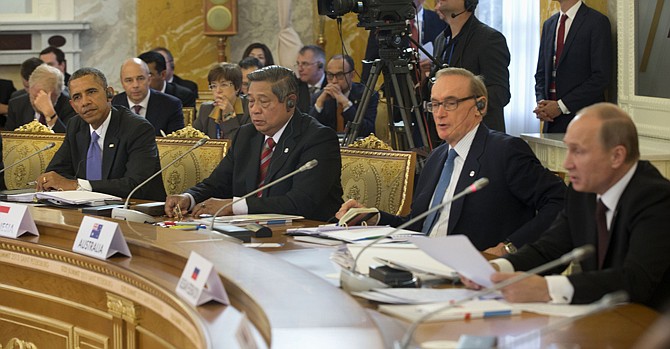ST. PETERSBURG, Russia (AP) - President Barack Obama pressed fellow world leaders on Thursday to support a U.S.-led strike on Syria, but he ran into opposition from Russia, China and even the European Union - which condemned the deadly recent chemical weapons attack in Bashar Assad's country but declared it too soon for military action.
"The use of chemical weapons in Syria is not only a tragedy but also a violation of international law that must be addressed," Obama insisted during a meeting with Japanese Prime Minister Shinzo Abe on the sidelines of the Group of 20 economic summit, where he mostly made his case behind the scenes.
China's G-20 delegation spokesman, Qin Gang, was among those who countered, saying: "War isn't the fundamental way to solve problems in Syria."
Obama's public and private diplomatic wrangling partly was intended to ratchet up pressure on lawmakers back in Washington as they debate authorizing military action. The Senate Foreign Relations Committee passed a use-of-force resolution this week, but the measure's prospects in the full Senate and the House of Representatives are uncertain.
The prospect of military action against Syria overshadowed the global growth agenda at the two-day G-20 summit, which opened Thursday in this historic Russian city on the Baltic Sea. Leaders did, however, discuss the crisis during a dinner hosted by Russian President Vladimir Putin, one of the Syrian government's strongest supporters.
White House advisers said Obama was seeking "political and diplomatic" support from his international counterparts, not necessarily military cooperation. And Ben Rhodes, Obama's deputy national security adviser, said the type of action the U.S. is contemplating "does not come with significant requirements of international participation."
While Obama has long called for the ouster of Assad, a deadly chemical weapons attack near Damascus two weeks ago pushed the U.S. to the brink of military action for the first time during Syria's civil war. The U.S. position on Syria has increased tensions with Putin, one of Assad's most important economic and military backers. Putin has blocked efforts at the United Nations to take action and has questioned intelligence reports American officials say link the chemical weapon deployment to the Syrian leader.
British Prime Minister David Cameron said Thursday that the United Kingdom had fresh evidence that was being examined at British laboratories.
Ahead of the U.S. president's arrival in St. Petersburg, Putin told The Associated Press in an interview that it was "completely ridiculous" to assert that Assad was behind the use of deadly gases against Syrian citizens. The Kremlin also announced it was boosting its naval presence in the Mediterranean, where the U.S. has five destroyers on standby for a military strike.
In keeping with the economic theme of the meeting, Chinese officials said military action would have a negative impact on the global economy, particularly oil prices.
The European Union also was skeptical about the effectiveness of military action. EU President Herman Van Rompuy told reporters in St. Petersburg that the August chemical weapons attack "was a blatant violation of international law and a crime against humanity," but he said a political, not military, solution was needed in Syria.
"While respecting the recent calls for action, we underscore at the same time the need to move forward with addressing the Syrian crisis through the U.N. process," Van Rompuy said.
The U.S., too, backs a political resolution in Syria, but has largely given up on efforts at the U.N., where Russia has blocked Security Council efforts to punish Assad. Rhodes said Thursday that the Obama administration was "highly skeptical" that Russia would take a different posture if the U.S. sought new resolutions at the Security Council.

